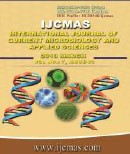


 National Academy of Agricultural Sciences (NAAS)
National Academy of Agricultural Sciences (NAAS)

|
PRINT ISSN : 2319-7692
Online ISSN : 2319-7706 Issues : 12 per year Publisher : Excellent Publishers Email : editorijcmas@gmail.com / submit@ijcmas.com Editor-in-chief: Dr.M.Prakash Index Copernicus ICV 2018: 95.39 NAAS RATING 2020: 5.38 |
Natural microflora of three Dadih products from Lembah Gumanti District, Solok Regency, West Sumatra has been analyzed and compared. Dadih (Dadiah: in Minangkabau dialect) is well known as an original and typical traditional food of West Sumatra. Dadih is fermented milk product made from water buffalo milk in a bamboo tubes. The study was purposed to analyze the composition of acid fermentative and proteolytic bacteria in dadih, to compare the character of the potential acid fermentative isolate as a probiotic candidate, to determine the pathogenicity of the isolates. The study was done in survey method and the data were analyzed descriptively. The result showed that the presence of acid fermentative bacteria in dadih from AiaSunsang (70.107cfu/g) and AiaAbu (60.107cfu/g) higher than proteolytic bacteria in there (11.107cfu/g and 16.107cfu/g), while dadih from Cubadak showed that the presence of proteolytic bacteria (98.107cfu/g) higher than acid fermentative bacteria (14.107cfu/g). Two isolates of each dadih were selected as candidate of probiotics. Isolate DCU1 and DCU2 of dadih from Cubadak were Gram-positive cocci, they included to genus Streptococcus, while isolates DAS1, DAS2, DAA1 and DAA2 of dadih from AiaSunsang and AiaAbu were Gram-positive bacill, they included to genus Lactobacillus. All of the isolates were non-pathogenic bacteria and belong to group of lactic acid bacteria.
 |
 |
 |
 |
 |